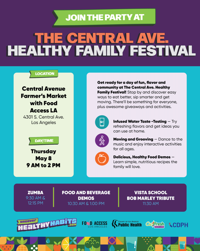
(Photo by Element5 Digital on Unsplash)
De Los hosted a stage at the LA Times Festival of Books late last month, making space for discussions on the 2024 presidential election and President Donald Trump’s first 100 days in office.
L.A. Times columnist Gustavo Arellano moderated the panel discussion with Manuel Pastor, director of USC’s Equity Research Institute; Fatima Flores, political director at the Coalition for Humane Immigrant Rights (CHIRLA); and Mike Madrid, a political consultant with decades of experience working with George W. Bush, former mayor of L.A. Antonio Villaraigosa and others.

(Photo credit Gisselle Palomera)
The panel titled “Voto Latino: Post Election Reflections”focused on the perspective of these Latin American academics who have worked on the ground and with many community members, before, during and after the 2024 election.
“I think that one of the big mistakes in the last election was to think that Latin American issues somehow had a small box around them, that were focused on a very particular set of things,” said Pastor.
In an Unidos U.S. poll based on the 2024 election results, the most important issues Latinos voted on were cost of living, inflation, jobs, the economy, housing costs and affordability and healthcare costs.
The CNN exit poll for the November election showed that Latinos supported Harris over Trump in these issues.
“This voter group is driven overwhelmingly by economic conditions and regardless of which party is in power, if they don’t feel that [they are] addressing it, then they are not going to support [them],” said Madrid.
In 2024, Madrid published a book titled“The Latino Century: How America’s Largest Minority Is Shaping Democracy.” Madrid says he wrote the book as a warning of what was to come as far as a shift in the immigrant and Latino community.
“I want to make it very clear that my book was not a prediction, although basically everything that I wrote ended up [happening]. It was a warning. It was a warning that what was happening amongst Latino voters was unique,” said Madrid.
He spoke about a shift happening in Latinidad that was shaping the issues that voters cared about. There is an overwhelming majority of Latino voters who vote in favor of the candidate that promises economic stability and growth, rather than the one who stands by them and their communities.
Economic issues are overwhelmingly the reason for many voters shifting their preferred party and the 2024 election was no different.
Flores, who works on the ground with these communities across the state, says that Latinos are facing the regret of voting for Trump as they see how many issues are now affecting them personally and seeing how much the Republican Party is underdelivering on its promises.
“Latinos feel abandoned. They feel discontent. They feel disillusioned by both parties,” said Flores.
Madrid says he believes that in California, he has witnessed a foundational change in Latinidad and the Latino narrative that was almost exclusively set around the immigrant and immigration narrative.
“With the explosion of a third and now a discernible fourth generation of Latino voters… we’re seeing some of the fastest percentage growth happening amongst third and fourth generation Latino voters, who are overwhelmingly an ‘economic voter,’” said Madrid.
Pastor, who focuses mostly on Latino issues and equity research, states that he notes a division happening within the Latino community when it comes to class issues. He also notes that this election made it very clear that there are a lot of voting issues rooted in anti-Blackness and misogyny.
“If you talk to a lot of working class Latino men, their inability to see a woman as a strong leader is very much real,” said Pastor.
Another thing that Pastor says he noticed prior to the election was that older generations of Latino immigrants were not being as sympathetic to the new wave of immigrants, such as those who were from Venezuela and seeking asylum.
“We didn’t deal with that seriously enough to understand that older immigrants were not necessarily sympathetic to newer immigrants,” said Pastor.
Another topic of interest that Pastor says he noted in his research was around Latino identity.
“Latinos do not arrive into the world as Latinos, we are made,” he said. “We are made politically. We are made culturally.”
On that note, he points out that the term BIPOC, which stands for Black, Indigenous and People Of Color, puts the Latino experience aside. He strongly believes that the more intelligent way of discussing this issue within our communities, is to replace the term with Black-Brown coalition building.
“A lot of these fads by progressives have been counterproductive to what we need to do,” he asserted.
The ray of hope he sees is rooted in the combination of rethinking what we have done, and the overreach of the Trump administration, which has proven that they don’t actually know how to manage an economic recovery.
According to Madrid, there is very little evidence to support the misconception that Latinos are becoming more conservative or Republican. He says however, that there is a lot of evidence suggesting that Latinos are becoming more populist.
He also sees the housing crisis as a problematic issue in California that created the divisiveness that we are seeing politically.
“The housing problem that we have in California has created such an inability to survive, that people will still say that the Democratic party is the party that supports [their] values, but they don’t believe that voting for [that party] is going to change anything,” he said.













(0) comments
Welcome to the discussion.
Log In
Keep it Clean. Please avoid obscene, vulgar, lewd, racist or sexually-oriented language.
PLEASE TURN OFF YOUR CAPS LOCK.
Don't Threaten. Threats of harming another person will not be tolerated.
Be Truthful. Don't knowingly lie about anyone or anything.
Be Nice. No racism, sexism or any sort of -ism that is degrading to another person.
Be Proactive. Use the 'Report' link on each comment to let us know of abusive posts.
Share with Us. We'd love to hear eyewitness accounts, the history behind an article.